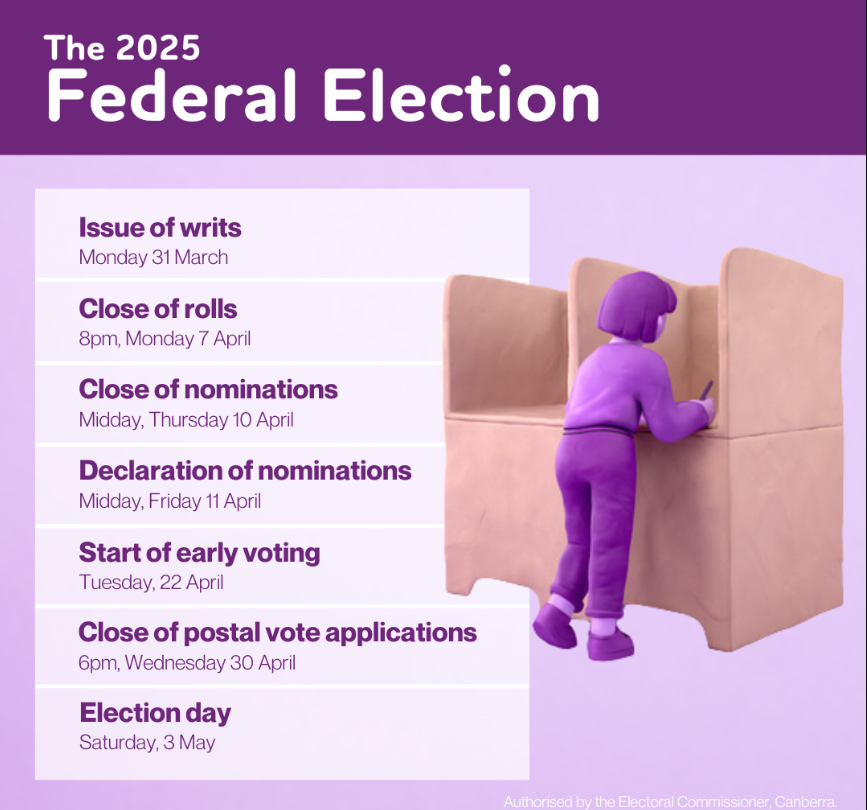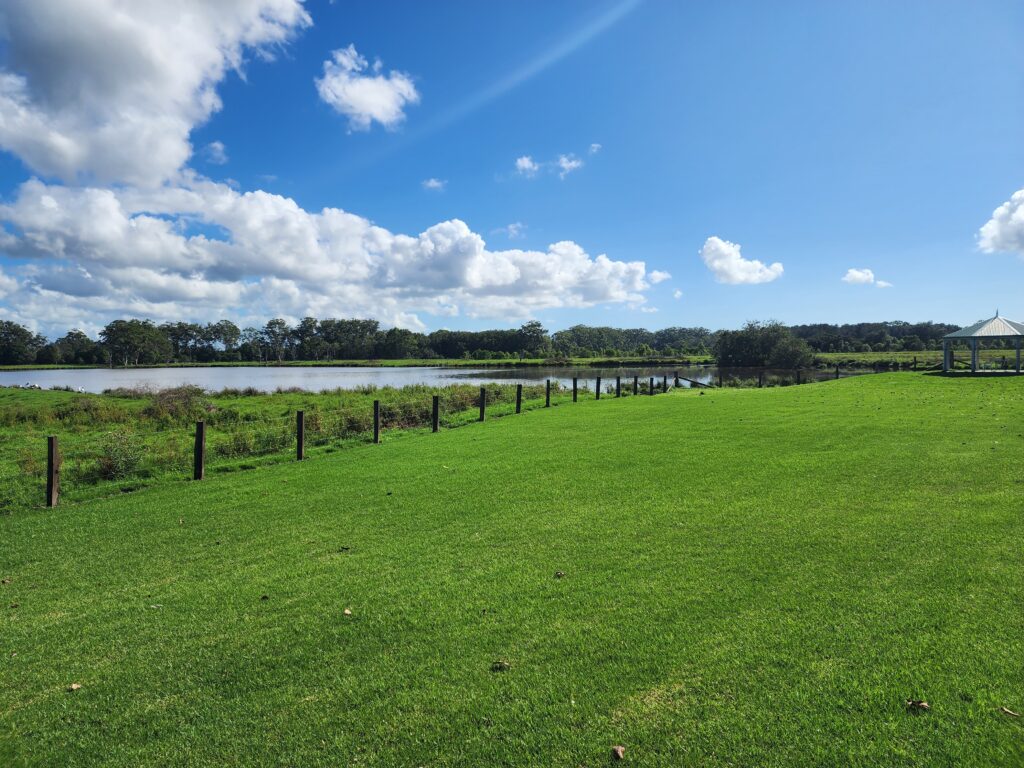Australia’s Prime Minister, Anthony Albanese, has called the federal election for Saturday, 3 May – that’s only 36 days away – let’s take a look at what you need to do to make your vote count.

By Jacquelene Pearson
I’m writing this from my home on the Central Coast of NSW. I live in the Bellwether federal electorate of Robertson, currently held on a 3.56% first preference margin by first-time Labor MP, Dr Gordon Reid. A bellwether seat means that whoever wins this electorate usually comes from the party that forms government.
The major party battle for Robertson is a rematch between Dr Reid and the former Liberal Member and Scott Morrison favourite, Lucy Wicks. Both candidates have had their corflutes and yard signs on display for weeks. Ms Wicks has been seen “inconspicuously” grocery shopping at West Gosford Coles, shoulder to shoulder with the locals, just around the corner from where she grew up. Dr Reid has been on the hustings since early January.
The two-party preferred swing against Wicks in 2022 was -6.5% but the swing (irrespective of which way it flows) is not expected to be that big this time around.
Of course, there will be other candidates. Kariong resident, Lisa Bellamy, has announced her plan to run as an independent with a strong environmental justice position. The Greens have announced their candidate for Robertson – Cheryl Wallace.
Eleven candidates competed for the electorate of Robertson in the 2022 federal election, including independent and minor party candidates. A few things have changed in the past three years but the diversity of candidates is expected to remain.
The 2025 election will be the first time that the younger generations, Y, Z and millennials, will outnumber the Baby Boomers and Gen X. And when the choice between candidates from the two major parties is about as interesting and choosing between two slices of white bread, the voting behaviour of those younger generations will be interesting to watch.
There’s been a sense of “who cares” about recent elections. I remember overhearing a young man, let’s call him ‘Tradie Dave’, ahead of me in the line at the polling booth in 2022 telling the AEC worker he was only there to “get his name signed off and avoid the fine”.
Well, here are some reasons why you should care about voting in the 3 May federal election and what you can do to prepare to make the best possible choice, whether you live in a Bellwether or any of the other 150 seats from the 151 that make up the House of Representatives.
It’s about democracy
The Commonwealth of Australia is a representative democracy where every citizen who is 18 or older and registered to vote has a compulsory vote in federal, state/territory and local government elections. If you’re on the electoral role and fail to vote, you will be fined.
Compulsory voting has pros and cons. It means people like ‘Tradie Dave’, who I mentioned earlier, get to vote when they don’t care about the system or who gets elected. It also means that the Australian Electoral Commission (AEC), has an obligation to set up a polling station in every single remote community across this vast land and that is particularly good news for First Nations people living in those remote communities.
We are living in very strange times when despots and tyrants appear to be on the ascendancy. According to the World Population Review, six nations currently have totalitarian regimes in power. Another 23 have had histories of totalitarianism.
The list of authoritarian governments is currently much longer – 59 including Russia, China, Syria, Afghanistan, Libya, Sudan, Iran and Vietnam.
According to a one-year-old Politico article, the right is rapidly rising across Europe: “Six EU countries — Italy, Finland, Slovakia, Hungary, Croatia and the Czech Republic — have hard-right parties in government. In Sweden, the survival of the executive relies on a confidence and supply agreement with the nationalist Sweden Democrats, the second-largest force in parliament. In the Netherlands, the anti-Islamic firebrand Geert Wilders is on the verge of power, having sealed a historic deal to form the most right-wing government in recent Dutch history,” it reported last May.
And then there is the democratic decision the majority of American voters made last November. The United States President Donald J Trump’s second term in the Whitehouse reverberates through world headlines, markets and war zones on a minute-by-minute basis. Are we witnessing the real time demolition of the world’s largest representative democracy?
So, if you’re still not convinced that your vote is important, take a good look around you, take the blinkers off and give yourself a bit of a talking to.
Get enrolled – fast
If you are turning 18 on or before 3 May, you need to enrole soon. You must be correctly enrolled by 8pm local time Monday 7 April 2025, according to the AEC. It takes you through the process step-by-step so don’t delay.
The same deadline applies if you’re already enrolled but need to update your details – your name and address, for example. Again, visit the AEC website for instructions.
Overseas
You can vote if you’re out of the country but, again, you’ll need to be organised. There will be voting centres during the early voting period (two weeks before 3 May) or postal voting is another option. Again, visit the AEC and follow the instructions so you don’t miss out.
OK, now you’re all set to vote, the next step is to figure out who you want to vote for.
Start with your values
It’s as simple as deciding what you are passionate about and what your values are. Then you can decide which candidates align most closely with those values and take it from there.
The Point is an ESG News Site so you can bet that we will be focusing on the credentials of the various parties and individual candidates from the point of view of their positions on social justice, environmental justice and good governance.
You might care more about the arts or education (we care about those things to). You may care about the rights of nature or animal justice or legalizing cannabis.
What ever floats you boat, this is the best starting point for deciding how to vote.
Three tiers
Another thing that always astonishes me at election time is how many people don’t understand the difference between federal, state and local elections.
We have three levels of government in Australia and, with some overlap, each level is responsible for different things. That’s why it is important to match up your values before May 3 with what areas of the operations of the Federal Government they relate to.
If you really don’t know where to start try going to the website of our national parliament and having a scan through.
Our national government is responsible for defense, citizenship, higher education, migration, our nation’s environment, Medicare and so on. If you’re worried about roads, local schools or your fishing license, you will need to wait for the next state/territory election. Rates, local roads and rubbish are the purview of your local government or council.
If you want your vote to count, it really is worth having a basic understanding of what each level of government is responsible for. Then you can hone in on the issues that matter most to you at that level of government and hone your approach to voting.
Find out who is standing
The next step is to find out who is standing as a candidate in your local electorate. If you don’t know what federal electorate you live in, you’ll need to establish that first. Visit the find my electorate page and enter your town or suburb’s name to find out
In terms of then finding out who is running in your seat or electoral division, you will have to wait a while for the final list.
Nominations open at the Issue of Writ, which will happen on Monday given the Governor General Sam Mostyn AC accepted the advice of the Prime Minister this morning and agreed to dissolve parliament and send the country to the polling booths.
Subsequently, single House of Representatives and Senate nominations will close at 12 noon onThursday 10 April 2025. Bulk House of Representatives nominations close at 12 noon on Tuesday 8 April 2025. Then all candidates get listed by the AEC. There will be a ballot draw to decide their position on each electorate’s ballot paper and another for the Senate.
If you want to know before then, the first step is to find out who your current federal representative is, whether they are independent or belong to a party, whether they are standing for re-election and whether their values and priorities align with your own.
It’s also a good idea to engage with your local news outlets – traditional and digital so you can be ahead of the curve as people declare their candidacies.
Make your decision
Many communities hold candidate forums. Candidates door knock, letterbox drop or have stalls at local shopping centres so seek them out and have a chat. Some even set up campaign shops or offices so keep an eye out.
And remember you have more than one choice. Our system is called preferential voting. That means if you decide to vote below the line, if your first preference gets knocked out, your second preference may be counted. In tight competitions, like the Bellwether or Robertson, preference flows can determine who wins.
So don’t shy away from this election and if you already know what you’re doing, have conversations with those who may not be as well informed. Good governance in a representative democracy is determined by the engaged and active participation of those who are represented. As the old saying goes, “you get the government you deserve”.


